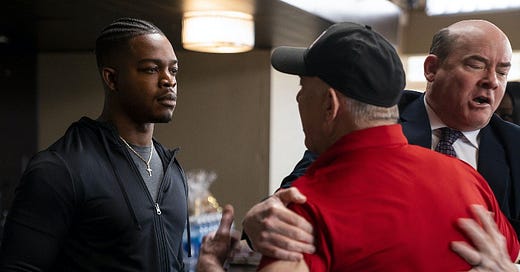National Champions
Solid acting from a stacked cast elevates this football movie with no football in it.
The Film Yap is a reader-supported publication. To receive new posts and support my work, please consider becoming a free or paid subscriber.
You don’t have to be into football to dig director Ric Roman Waugh’s “National Champions” (now in theaters). In fact, as there isn’t a single snap shown and college athletics are conveyed in a rather negative light, it might actually behoove audience members to not be fans of the game. Conversely, I’m a sports junkie (by admission more of a Sunday football guy than a Saturday football guy) and I still enjoyed the picture a great deal.
LeMarcus James (Stephan James) and Emmett Sunday (Alexander Ludwig) are the Heisman Trophy-winning star quarterback and starting tight end for the fictitious Missouri Wolves collegiate football team respectively. The Wolves are in New Orleans to play against the also fictitious Utah Cougars in the National Championship. This should be the last game of James’ collegiate career before being selected No. 1 overall by the Miami Dolphins (hey, a real team!) in the NFL draft and the last game Sunday ever plays as he’s a senior and has no professional prospects. Alas both men are opting to boycott until their demands (compensation and long-term health insurance for players) are met and are encouraging their teammates and opponents to follow suit.
The young men’s actions draw the ire of their coach James Lazor (J.K. Simmons), who’s being pressured to get them to return to the fold and the field by sleazy boosters Rodger and Taylor (Tim Blake Nelson, Andrew Bachelor), sleazier Conference Commissioner Everly (David Koechner), smarmy NCAA bigwig Mike Titus (Jeffrey Donovan) and Titus’ shark-like legal counsel Katherine (Uzo Aduba, late of HBO’s “In Treatment”). Lazor leans on his defensive coordinator Coach Dunn (Lil Rel Howery – my most watched actor of 2021 with eight (!!!) movies) for assistance, which he’s greatly in need of during this particularly daunting week wherein his marriage to Bailey (Kristin Chenoweth) is also imploding. Further complicating matters is the presence of Philosophy professor Elliott (Timothy Olyphant), who has ties to both Bailey and the boycotting players.
“National Champions” is written by Adam Mervis (“21 Bridges,” which conveniently enough co-starred both James and Simmons) and it’s much more akin to the works of David Mamet and Aaron Sorkin than it is to the oeuvre of Ron Shelton – prolific sports auteur of the 1980s and 1990s. The proceedings do take on an air of soap opera sudsiness at times – which will certainly turn off some viewers – it actually added to my overall enjoyment.
The vast majority of the movie is characters speechifying in hotel rooms, but a lot of this stuff is every bit as exciting as the gridiron action we’re lacking – it’s capably written and expertly performed. Simmons and Aduba make absolute meals out of their monologues. James, an actor whose work I’ve greatly admired previously in “Selma” and “If Beale Street Could Talk,” imbues his character with decency. To the film’s credit it doesn’t entirely vilify Lazor nor Katherine. Lazor loves his players, but he’s not above profiting off or exploiting them. Katherine will do dirt to others, but it’s clearly conveyed how much she scraped and struggled to get where she is.
Stuntman-turned-filmmaker Waugh is an interesting choice to direct – all of his movies have an action bent to them (he did the Gerard Butler double shot of “Greenland” and “Angel Has Fallen” as well as prison-tinged pictures “Shot Caller,” “Snitch” and “Felon”) – but they also often have other weightier matters in mind. This is Waugh operating solely through mind without might. Waugh, Mervis and “National Champions” itself clearly sympathize with these players. It’s cool that these kids are now allowed to profit off their name, image and likeness, but the movie seems to suggest (and I agree) that the NCAA needs to do more for the athletes less likely to profit from endorsements or go onto lucrative professional careers whose bodies still feel the years of punishment from which others have profited.





